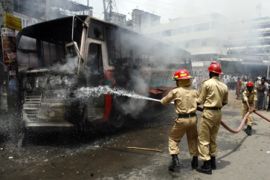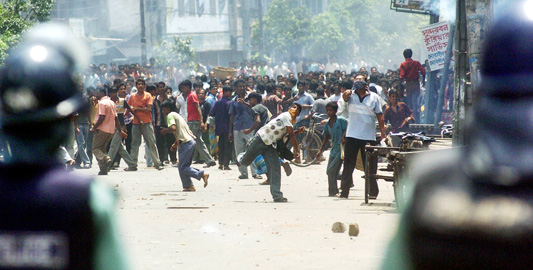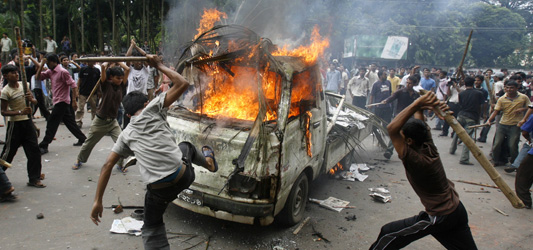Curfew in Bangladesh after rioting
Government imposes restrictions in six cities in wake of violent student protests.

 |
| Riots have spread from the capital to other towns in Bangladesh [AFP] |
Bangladesh’s military-backed government has imposed an indefinite curfew in six cities after violent student protests left one man dead and at least 50 injured.
The curfew, which came into effect on Wednesday, includes the capital Dhaka. All colleges and universities in the six cities have been closed as part of the restrictions.
Keep reading
list of 4 itemsThirty years waiting for a house: South Africa’s ‘backyard’ dwellers
Photos: Malnutrition threatens future Afghan generations
From prisoner to president in 20 days, Senegal’s Diomaye Faye takes office
“The government has declared a curfew in six divisional cities from 8pm until further notice,” Fahim Munaim, press secretary to Fakhruddin Ahmed, head of the country’s caretaker government, said.
Before ordering the curfew, a government statement said the authorities would take “stern actions against anyone engaged in rowdy and anarchic acts”.
The other five cities affected by the curfew are northern Rajshahi and Sylhet, southern Chittagong, Barisal and Khulna.
All eight private television channels in Bangladesh stopped showing footage of the violence and mobile telephone networks went down for several hours after the curfew came into effect.
“We request channels to stop televising footage of violence until further order because this might instigate further violence,” Mainul Husein, the government’s information adviser, said.
Boycott
The student protest, which began at Dhaka University, inspired similar action across the capital and other cities in Bangladesh.
The clashes with police continued on Wednesday, despite an apology from the interim government and the closure of an army camp at the university gymnasium, one of the demands made by the students.
In the capital, students from half a dozen colleges and universities took to the streets in support of their colleagues at the Dhaka campus, the largest in the country who boycotted lectures for the third consecutive day.
At least six vehicles were burned and similar clashes with police were reported in the northwestern town of Rajshahi, the southern coastal town of Barisal and several other places.
At least 50 people were injured in the fighting at Rajshahi university and at a college in Khulna city in the southwest, witnesses said.
“The situation is deteriorating as teachers now have came out to join protesting students,” said a police officer in Dhaka.
The violence has shut shops, forced public transport off the streets and caused panic among residents in affected areas, witnesses said.
The Bangladeshi army had begun to withdraw troops from the camp at the Dhaka University gymnasium after fighting on Tuesday left at least 150 students injured.
Soldiers had been stationed in the university’s gymnasium since they were deployed there in January by the military-backed interim administration following months of political violence.
Restrictions
The government issued an apology over the incident and confirmed the troop withdrawal had begun late on Tuesday. Students, fed up with the army presence, had begun rioting on Monday.
Police used tear gas and rubber bullets to try and disperse the students who responded by throwing stones and wielding sticks.
A statement from the information ministry issued on Tuesday evening said: “The interim government deeply apologised for the incident and ordered immediate withdrawal of the army camp from the campus and an inquiry into the unfortunate incident.”
Jubilant students chanted “victory, victory” and lit candles to celebrate as troops began their departure preparations, but were subsequently told to calm down by the university’s acting vice-chancellor, AFM Yusuf Haider.
Similar clashes the previous night injured more than 100 people. The violence started when students began protesting against the presence of army troops during a football match at what is the country’s largest university.
Protests and street assemblies have been banned in Bangladesh since the interim government took power on January 12 under a state of emergency.
Monday’s fighting was the first major defiance of the restrictions and spread across campus after troops reportedly assaulted several students.
The interim administration has said it will crack down on political corruption before holding an election late next year.
 |
| The violence was the first major defiance of emergency laws imposed in January [Reuters] |